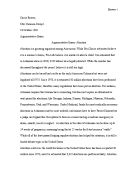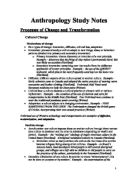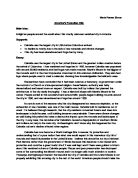Americans and a World in Crisis
Chapter 25
Myths of the atrocities of the war include the truth of a fight against the aggression of Nazi Germany and Japan but that all fought together in the foxhole, minorities included, and together in the factory. The courageous U.S. soldiers came and quickly adjusted to American life having committed no atrocities abroad. Human nature ceased to exist on the battlefield and an emotional recklessness abandoned by passion consumed all.
Its effects on America included the lift of depression, a redistributed income, and a transformation into a middle class society but all was not that simple as discrimination, prejudice, and the ignored growing poverty remained hidden.
The United States in a Menacing World
1933-1939
Nationalism and the Good Neighbor
- President Franklin D. Roosevelt
- Good Neighbor Policy (1933)
- Latin America
- No state has the right to intervene in the internal or external affairs of another
- FDR withdrew the last U.S. troops from Haiti and the Dominican Republic
- American bankers loosened their rip on Haiti’s central banking system
- It renounced the Platt Amendment
- Reduced U.S. role in Panamanian affairs
- Cuba
- Economic crisis in 1933
- Leftist regime rose but U.S., instead of sending in marines, provided indirect aid to a conservative revolt that overthrew the radical government in 1934
- Fulgenio Batista led conservative revolt
- Tariff on Cuban sugar cane lowered by U.S. to support Batista
- Batista overthrown by Fidel Castro in 1959
- Mexico
- Nationalized oil companies owned by U.S. and Britain
- U.S. demanded fair compensation
- After lengthy negotiations, a compensation agreement was formed
- Good Neighbor Policy did not end U.S. interference in Latin America nor ended resentment of “rich Uncle Sam” by Latin countries but did better relations with Latin America which would prove useful in World War II and the Cold War
The Rise of Aggressive States in Europe and Asia
- Italy
- Benito Mussolini and his Fascist party seized power in 1922
- Imposed one-party rule
- Invaded Ethiopia in October 1935 (in order to create a Roman empire)
- Germany
- Adolf Hitler becomes Germany’s chancellor (January 1933)
- National Socialist party (Nazi)
- Began a program to purify Germany of Jews whom he blamed responsible for the defeat in World War I (regarded them as the “inferior race”)
- Violation of the Versailles Treaty
- 1935: began a military buildup
- 1938: rolled tanks into Austria and declared Germany and Austria an Anschluss (union)
- 1938: Hitler claimed his determination to take the Sudetenland (a part of Czechoslovakia containing 3 million ethnic Germans)
- Appeasement:
- In order to avoid war, France (Edouard Daladier), Great Britain (Neville Chamberlain), Italy (Benito Mussolini), and Germany (Adolf Hitler) met in September 19, 1938 in Munich, Germany to surrender to Hitler’s demands to take the Sudetenland
- FDR applauded Chamberlain for having secured “peace in our time” and not have to go to war
- The Munich Pact was signed by the four nations
- World War II began about one year after its signing
- Japan
- Militarists gained control of the government
- In its quest for raw materials, Japan began an expansionist movement
- 1931: Japan sent in troops into the northern Chinese province of Manchuria (within two years it had total control of Manchuria)
- 1937: After having signed treaties of political alliance and mutual defense with Germany and Italy, Japan began a full-scale war against China
The American Mood: No More War
- World War I
- Americans felt it had been a mistake to get involved in the first World War
- Had not made the world safe for democracy
- Spurred an isolationist sentiment to not get involved in Old War quarrels
- People felt intervention should not be repeated
- Opposed policies that might involve them in war
- The Great Depression
- People felt the government should be more involved in America’s economic situation than in foreign affairs
- Neutrality Acts (1935-1937)
- Outlawed arms sales and loans to nations at war
- Barred Americans from traveling on the ships of belligerent powers
- Louis Ludlow
- 1938: He proposed a constitutional amendment requiring a national referendum on any U.S. declaration of war except in cases of direct attack
- FDR rejected it and persuaded Congress to reject it
- Did not pass Congress only by the narrowest of margins
- Challenging Nazi theories
- 1936 Olympics in Berlin
- African-American track star Jesse Owens won four gold medals and broke or tied three world records (way to go!)
- Black-American Joe Louis knocked out German fighter Max Schmeling in the first round of their world heavy-weight championship fight
The Gathering Storm: 1938-1939
- Violation of the Munich accords
- March 15, 1939: Nazi troops invaded what remained of Czechoslovakia
- German-Soviet Nonaggression Pact
- Hitler agreed to a pact with Stalin that their nations would not attack each other
- Would divide Poland after Germany invaded it








